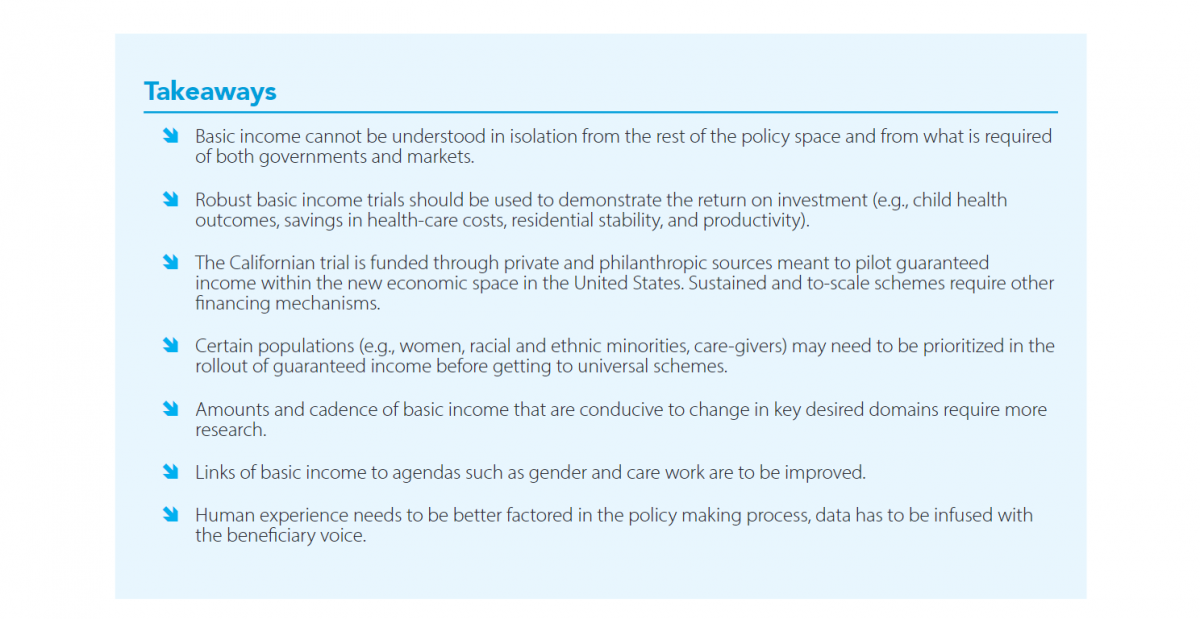
Welcome to our expert series on the post-COVID reset. That is, a reset along a more inclusive path. The series introduces listeners to leading thinkers as they debate concrete policy options for such a recovery and take stock of the data that could (and should) inform these policy shifts.
This is a 3-part podcast on the Californian guaranteed income experiment. The discussion goes deep into the trial, probing it from all angles – design, results, financing – and extracting lessons that others might draw on.
Our experts are Stacia West and Amy Castro Baker. Their expertise is in basic income, unconditional cash transfers, women’s poverty, and wealth inequality. They are the independent co-evaluators of the guaranteed income trial in Stockton, California. Their roles and the data these evaluators bring are key to our discussion today.
The hosts are UNESCO’s John Crowley and Iulia Sevciuc.
Part 1: Design, results, and performance in crisis
This part is concerned with the Californian pilot itself. It delves into the:
- Design of the trial. What was the basic set-up (numbers, criteria, process, evaluation, limitations) and how it was meant to interact with the rest of the social security system and the existing safety net?
- Results. What are the key outcomes, including gendered outcomes, and why was there such a strong impact on employment?
- Crisis. How did the pilot (unintentionally) overlap with the COVID-19 pandemic and what can be learned from that?
Part 2: Financing
Financing is critical to any talk on basic income. This part discusses:
- The Californian case. How, specifically, was the Stockton guaranteed income pilot funded?
- Scale-up. How are the other 14 upcoming US pilots financed?
- Long-term sources. What are the options of financing sustained and sustainable basic income schemes? Whether and how could the traditional ways (e.g., oil and natural resource-derived funding, reallocation of existing funds) and innovative sources (e.g., carbon price-and-dividend, data-driven funding, and dividends from marketing socially-owned data) be combined?
Part 3: Data and policy
The final part talks data, gaps, and action needed on basic income. It goes into:
- Knowledge gaps. What is known and what is lacking in data on basic income?
- Policy use. What deserves increased attention in debates and decision-making on basic income?

Have you read?
Basic Income – think data then policy
Greening the Basic Income
Gender inequality in times of COVID-19 – give women cash
Minimum subsistence income, the Spanish way
Listen for more
Basic Income – deciphering the promises and the data
Close social protection gaps to reset equitably after COVID-19
Universal Basic Income and beyond - what are our options for recovery
On the go? Listen and subscribe here:
Also on: Apple Podcasts | Google Podcasts | Spotify | Amazon Music | YouTube | Deezer | Anchor
....
Stacia West is an Assistant Professor at the University of Tennessee College of Social Work. She is the co-founder and director of the Centre for Guaranteed Income Research at the University of Pennsylvania.
Amy Castro Baker is an Assistant Professor in the School of Social Policy & Practice at the University of Pennsylvania. She is the co-director of the Centre for Guaranteed Income Research at the University of Pennsylvania.
John Crowley is UNESCO's chief of research, policy and foresight. He is the author of 5 books and a further 100 academic articles and book chapters, mainly on political theory and comparative politics.
Iulia Sevciuc is UNESCO’s lead on inclusive policies and the data-driven policy change. Prior to this appointment, Iulia worked with the United Nations Development Programme (UNDP) in Indonesia and Moldova.
The facts, ideas and opinions expressed in this piece are those of the authors; they are not necessarily those of UNESCO or any of its partners and stakeholders and do not commit nor imply any responsibility thereof. The designations employed and the presentation of material throughout this piece do not imply the expression of any opinion whatsoever on the part of UNESCO concerning the legal status of any country, territory, city or area or of its authorities, or concerning the delimitation of its frontiers or boundaries.
